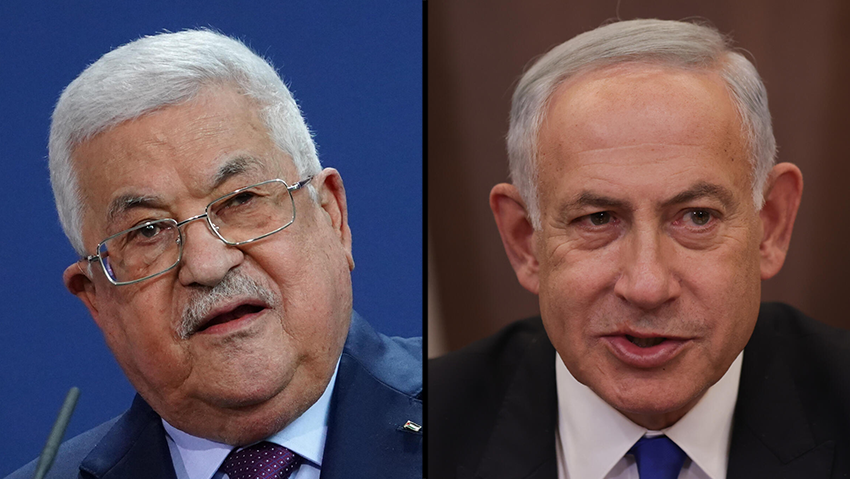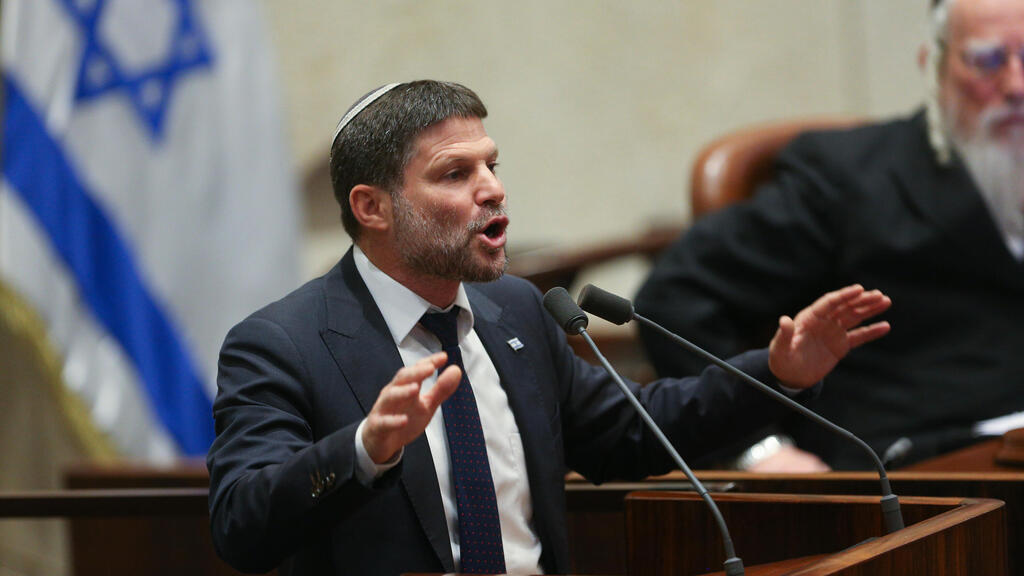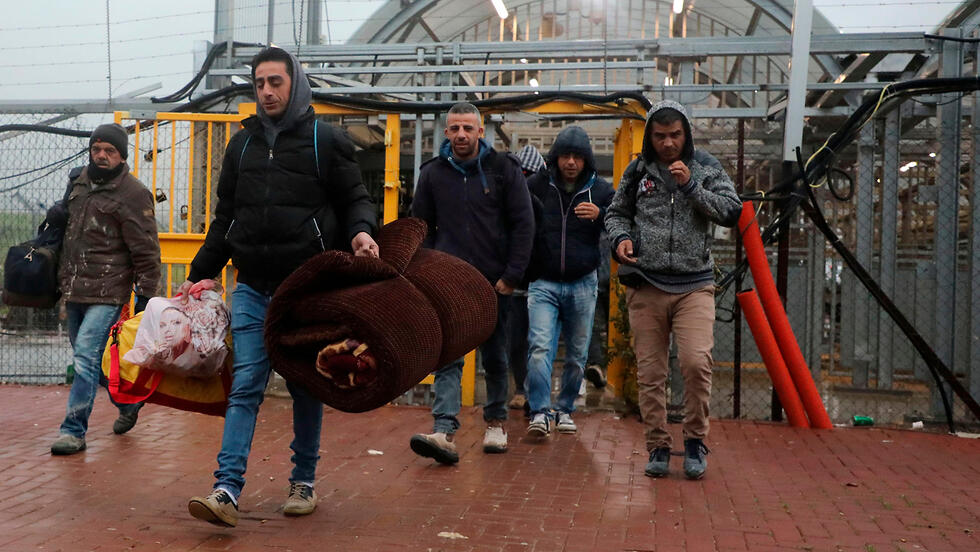Getting your Trinity Audio player ready...
Among all of Israel's security challenges, the Palestinian challenge is arguably the most complex and sensitive. In the face of Palestinian Authority subversion, which undermines the Israel Defense Forces' ability to deal with other significant challenges, the security apparatus recently has been exploring a series of strategic decisions – decisions whose approval could encounter political resistance.
Read more:
It currently remains unclear whether Prime Minister Benjamin Netanyahu, with the support of Defense Minister Yoav Gallant, National Security Advisor Tzachi Hanegbi, and the top brass of the security establishment, will succeed in persuading the cabinet ministers to approve such a plan, as crucial as it may be. The staunch opponents to these steps, including ministers Bezalel Smotrich and Itamar Ben-Gvir, consistently object to measures intended to bolster the Palestinian Authority.
3 View gallery


PA leader Mahmoud Abbas and Prime Minister Benjamin Netanyahu
(Photo: EPA, Ohad Zwigenberg)
In addition to stabilizing the security situation in the volatile region, such steps could advance a normalization deal with Saudi Arabia. In Washington and Riyadh, a keen eye is being cast on the Israeli government's decisions regarding the Palestinian Authority, as these decisions could significantly impact crucial strategic processes that might reshape the face of the Middle East.
According to reports from Ynet and Yedioth Ahronoth, the steps being considered in Israel encompass all aspects of the interface between Israel and the Palestinians. All of this is being coordinated with the U.S. government, which expects to witness significant changes on the ground from both sides. The following are the steps currently on the table:
Security Measures
One of the central issues that the Palestinians continue to raise with the Americans is the reduction of Israeli military operational activities in Area A territories, which are under Palestinian civilian and military control. Within the security framework, continuous activities of the Palestinian security mechanisms in the northern West Bank have been identified, and there is an understanding of the necessity to allow these mechanisms to operate in the region. Despite this demand, Israel clarifies that it will act to thwart any terrorist cell planning to harm Israeli citizens and security forces, regardless of location.
Just in the past day, the IDF arrested 21 wanted individuals in the West Bank, confiscating explosive devices, firearms, and terror funds that were located by the forces. This is the intricate daily reality of the security apparatus in the West Bank territories – countering terrorism every night in refugee camps and Palestinian cities, while still allowing Palestinian mechanisms to operate within their territory as much as possible.
3 View gallery


Minister Bezalel Smotrich is against measures to bolster the Palestinian Authority
(Photo: Alex Kolomoisky)
Another contentious issue at the heart of the Israeli-Palestinian conflict is the dispute over Area C territories, which are administered by Israel. The administration established by the current government, led by Smotrich, has taken charge of Area C after the authority transferred to it the power that was previously held by the Defense Minister. With the absence of approved construction plans in Area C, illegal construction by both Jewish settlers and Palestinians continues. Currently, Smotrich's administration, together with personnel from the Defense Ministry and the Coordination of Government Activities in the Territories unit, is formulating priority sequences for enforcing the crackdown on illegal construction in the territories. This issue is being closely followed by both the White House and the U.S. State Department.
The third issue that concerns Palestinians, as well as Americans and Europeans, is the struggle against nationalist crime. In the past six months, the number of nationalist crime incidents has doubled compared to the same period last year. Alongside the escalating clashes that occurred in Hebron and Turmus Ayya, clashes between Jews and Palestinians take place almost every week. Just this past weekend, this conflict claimed the life of a young Palestinian from the village of Burqa.
Within the security apparatus, an increase in the number of illegal Israeli outposts established in the territories has been identified – some even with official government approval. This escalation contributes to tensions and complicates the already intricate security reality. Within the Palestinian public, there is severe criticism of the security mechanisms, given the proliferation of nationalist crime incidents. They argue that these mechanisms fail to protect them from intruders entering Palestinian villages and towns.
Civil and Economic Steps
Within the security apparatus, it's been recognized that the closure of crossings during tense periods significantly impacts the Palestinian public, a majority of whom have become largely indifferent to the security turmoil over the past year. Consequently, efforts are being made to minimize the closure of crossings, allowing for the entry and exit of laden cargo trucks from Israel to Palestinian territories, fostering business connections between citizens on both sides of the crossings and, importantly, permitting over 150,000 Palestinian workers to enter Israel for daily employment.
Similarly, considerations are being made regarding the reduction of crossing closures during holidays and Israeli festivals, as the exclusion of Palestinian workers significantly affects the economy, which heavily relies on these workers in sectors like construction, agriculture, and industry. Additional measures being examined within the security apparatus include continuing the pilot program for Palestinians departing abroad through the southern Ramon Airport (initiated the previous summer), developing the offshore gas field opposite Gaza's coast in collaboration with Egypt, and equalizing the revenue the Palestinian Authority receives from tolls levied on Palestinians crossing at the Allenby Crossing (with half going to Israel and the other half to the PA).
All of these measures are intended to assist the Palestinian Authority in dealing with the ongoing budgetary crisis it has been grappling with in recent years. Due to this crisis, only 80% of Palestinian security personnel have received their salaries, while development budgets for infrastructure within the PA have been nearly reduced to zero.
Diplomatic Steps
The most challenging aspects in the diplomatic realm facing Netanyahu are public Israeli-Palestinian meetings, the continuation of the process mediated by Egypt, Jordan and the United States, and the release of bodies of terrorists held in Israel as well as the release of security prisoners.
Israel does not intend to release terrorists with blood on their hands, whether they are dead or alive. However, within the security apparatus, there is a position that allows for the release of adult and ill prisoners who are set to be released from prison soon anyway, as well as the bodies of terrorists not affiliated with a specific terror organization and lacking significance for future prisoner exchanges with Gaza.


